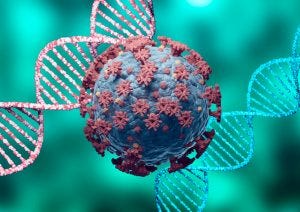
BioNTech says the manufacture of messenger RNA (mRNA) is simple and quick to adapt when dealing with COVID-19 variants threatening the efficiency of approved vaccines.
Just 15 months ago, BioNTech was a relatively unknown player in the biopharma industry. With a global pandemic, partnership with Pfizer, and a historically fast vaccine development, approval and roll-out under its belt, the German mRNA firm is now a household name.
In December 2020, the firm’s BNT162b2 became the first mRNA vaccine to be authorized for emergency use, and according to BioNTech already more than 200 million doses have been supplied. Going forward, the firm has signed orders for 1.4 billion doses in 2021, and said during its Q4 financial presentation last week it expects 2021 revenues of €9.8 billion ($11.6 billion).

Image: iStock/Gilnature
This estimate reflects expected direct sales to certain regions, sales to partners, and milestone payments, though CFO Sierk Poetting told shareholders “we expect additional revenues related to further supply contracts for deliveries in 2021.” Between itself and Pfizer, manufacturing capacity could reach 2.5 billion doses by end of 2021.
Management signaled the validation of mRNA through the success of its COVID-19 vaccine – mirroring the opinion of partner Pfizer last month – and intends to “rapidly industrialize” its technology across a range of infectious diseases and in the field of immuno-oncology.
Variations
But in the short-term, chief business and commercial officer Sean Marett spoke about the ability of easily adapting the modality to tackle emerging variants of COVID-19.
This is despite the 50,000 steps required from manufacturing the mRNA to the bulk drug substance.
“Unlike traditional vaccine production, we can adapt our manufacturing to encode a new variant if needed, simply by providing a DNA template which encodes the DNA sequence of the new variant,” he said on the call. “This can be done within a couple of weeks and without the need for new scale up of the overall process and pending regulatory approval.”
He added it takes nine to 13 days go from DNA production to fill & finish, with another four to five weeks for production, quality control, and release.
“Another advantage I would like to point out, we can increase or decrease manufacturing quantities with a short lead time. Thus our manufacturing technology provides us with the flexibility to respond to market demand.”
About the Author
You May Also Like

schedl_b_and_w.jpg?width=100&auto=webp&quality=80&disable=upscale)
schedl_b_and_w.jpg?width=400&auto=webp&quality=80&disable=upscale)



